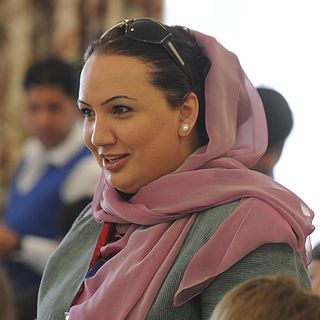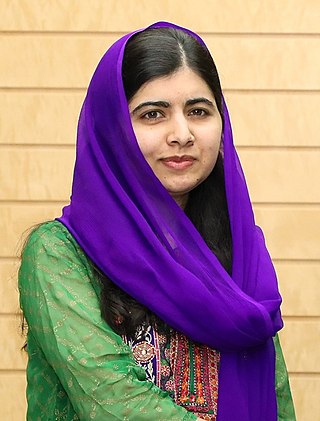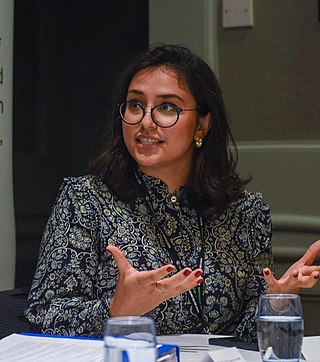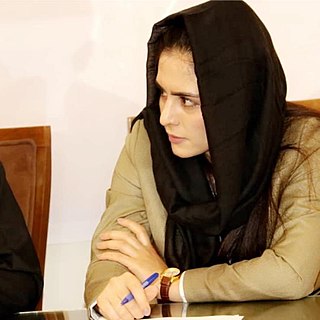Related Research Articles

The treatment of women by the Taliban refers to actions and policies by two distinct Taliban regimes in Afghanistan which are either specific or highly commented upon, mostly due to discrimination, since they first took control in 1996. During their first rule of Afghanistan, the Taliban were notorious internationally for their misogyny and violence against women. In 1996, women were mandated to wear the burqa at all times in public. In a systematic segregation sometimes referred to as gender apartheid, women were not allowed to work, nor were they allowed to be educated after the age of eight. Women seeking an education were forced to attend underground schools, where they and their teachers risked execution if caught. They were not allowed to be treated by male doctors unless accompanied by a male chaperone, which led to illnesses remaining untreated. They faced public flogging and execution for violations of the Taliban's laws.

Lesbian, gay, bisexual, and transgender (LGBT) people in the Islamic Emirate of Afghanistan face severe challenges not experienced by non-LGBT residents. Afghan members of the LGBT community are forced to keep their gender identity and sexual orientation secret, in fear of violence and the death penalty. The religious nature of the country has limited any opportunity for public discussion, with any mention of homosexuality and related terms deemed taboo.
Human rights in Afghanistan are severely restricted, especially since Taliban's takeover of Kabul in August 2021. Women's rights and freedom are severely restricted as they are banned from most public spaces and employment. Afghanistan is the only country in the world to ban education for women over the age of eleven. Taliban's policies towards women are usually termed as gender apartheid. Minority groups such as Hazaras face persecution and eviction from their lands. Authorities have used physical violence, raids, arbitrary arrests and detention, torture, enforced disappearances of activists and political opponents.

Malalai Joya is an activist, writer, and a politician from Afghanistan. She served as a Parliamentarian in the National Assembly of Afghanistan from 2005 until early 2007, after being dismissed for publicly denouncing the presence of warlords and war criminals in the Afghan Parliament. She was an outspoken critic of the Karzai administration and its western supporters, particularly the United States.

Women's rights in Afghanistan have varied greatly depending on the time period as well as the regime in power. After King Amanullah Khan's attempts to modernize the country in the 1920s, women officially gained equality under the 1964 Constitution. However, these rights were taken away in the 1990s through different temporary rulers such as the mujahideen and the Taliban during the Afghan civil war. During the first Taliban regime (1996–2001), women had very little to no freedom, specifically in terms of civil liberties. When the Taliban was overthrown by the United States following the September 11 attacks, women's rights gradually improved under the presidential Islamic Republic of Afghanistan. Women were de jure equal to men under the 2004 Constitution.

Shukria Barakzai is an Afghan politician, journalist and Muslim feminist. She was the ambassador of Afghanistan to Norway. She is a recipient of the International Editor of the Year Award.

Malala Yousafzai is a Pakistani female education activist and the 2014 Nobel Peace Prize laureate at the age of 17. She is the youngest Nobel Prize laureate in history, the second Pakistani and the only Pashtun to receive a Nobel Prize. Yousafzai is a human rights advocate for the education of women and children in her native homeland, Swat, where the Pakistani Taliban had at times banned girls from attending school. Her advocacy has grown into an international movement, and according to former Prime Minister Shahid Khaqan Abbasi, she has become Pakistan's "most prominent citizen."

Fawzia Koofi is an Afghan-Tajik politician, writer, and women's rights activist. Originally from Badakhshan province, Koofi was recently a member of the Afghan delegation negotiating peace with the Taliban in Doha Qatar. She is an ex Member of Parliament in Kabul and was the Vice President of the National Assembly.

Aryana Sayeed is an Afghan pop singer and songwriter. She sings mostly in Dari but also has many songs in Pashto and some in Uzbek. Sayeed also had hosting roles in musical television shows for the 1TV and TOLO networks along with appearances on reality shows. Sayeed has established herself as one of Afghanistan's most famous contemporary musical artists, performing regularly in concerts and philanthropic festivals within and outside Afghanistan.

Roya Rahmani is an Afghan diplomat who served as Afghanistan's first female ambassador to the United States and non-resident ambassador to Mexico, Argentina, Colombia, and the Dominican Republic from December 2018 to July 2021. She is currently the Chair of the international advisory company in development finance — Delphos International LTD. She is also a distinguished fellow at the Georgetown Institute for Women, Peace, and Security, a senior advisor at the Atlantic Council's South Asia Center, and a senior fellow for international security at the New America Foundation. From 2016 to 2018, she served as Afghanistan's first female ambassador to Indonesia, first ever ambassador to the Association of Southeast Asian Nations, and non-resident ambassador to Singapore.

Zarifa Ghafari is a former female mayor of Maidan Shahr, capital city of the Wardak Province, Afghanistan. Ghafari was one of the few Afghan female mayors, next to the first Afghanistan's mayor, Azra Jafari and Khadija Zahra Ahmadi, and was also the youngest to be appointed, at the age of 24. She is known for her efforts to advance women's rights in Afghanistan. Ghafari was chosen as an International Woman of Courage in 2020 by the US Secretary of State. She has survived three assassination attempts.

Shabnam Nasimi is an Afghan-born British social activist, commentator, and political figure. She was formerly policy advisor to Minister for Afghan Resettlement Victoria Atkins MP and Minister for Refugees Richard Harrington. A member of the Conservative Party, Nasimi was a candidate in the 2021 local elections.
Farahnaz Forotan is an Afghan journalist and women's rights activist. She moved to Iran together with her family during the Mujahideen regime. Farahnaz returned to Afghanistan in 2001, but took refuge in France in 2020 after being included on a Taliban's target list.

Crystal Bayat is an Afghan social activist and human rights advocate known for her protests against the Taliban takeover, advocacy for women rights and political activism inside and outside Afghanistan. A native of the Ghazni province, Shia (coming from the Bayat family, a Turkic ethnicity minority, Bayat was born in 1997 in Kabul. She grew up most of her life with democracy and positive societal changes. She is currently continuing the fight to preserve Afghan human right's achievements as an agent of change.
Benafsha Yaqoobi is an Afghan disability rights activist. She was named one of the BBC's 100 Women in 2021.
Muqadasa Ahmadzai is an Afghani social activist, politician and poet who ran in the 2018 Afghan parliamentary election. She is the recipient of a N-Peace Award and was named as one of the BBC's 100 Women in 2021.
Roshanak Wardak is an Afghan gynaecologist and former politician from Maidan Wardak Province. In 2021, she was named as one of the BBC's 100 Women, alongside fifty other Afghan women.
Tamana Zaryab Paryani is an Afghan journalist and women's rights activist known for her protests against Taliban rule in Afghanistan. She is widely recognised as a symbol of the women's struggle in Afghanistan. In December 2022, Tamana was named as one of BBC's 100 Women. She is a member of an Afghan women's rights activist group Seekers of Justice. She fled Afghanistan in August 2022 and now lives in Germany.
Razia Barakzai is an Afghan women's rights activist. She was named one of the BBC's 100 Women in 2021 for leading the first women's protests against the Taliban in August 2021, following their takeover of Afghanistan earlier that month.
Wahida Amiri is an Afghan librarian and women's rights activist. She was featured in the BBC 100 Women 2021 for her continued efforts protesting against the Taliban and their ban on women's education and right to work.
References
- 1 2 3 4 "In a rare victory for Afghan women, Kabul to include mothers' name on IDs". Arab News. 7 September 2020. Retrieved 20 December 2020.
- ↑ "Where Is My Name? Afghan Women Campaign To Reclaim Their Identities". RadioFreeEurope/RadioLiberty. Retrieved 20 December 2020.
- 1 2 Karimi, Orooj Hakimi, Storay (27 September 2020). "In the name of the mother: Afghan woman wins recognition, sparks Taliban opposition". Reuters. Retrieved 20 December 2020.
{{cite news}}: CS1 maint: multiple names: authors list (link) - ↑ "Laleh Osmany". RUMI AWARDS. Retrieved 20 December 2020.
- ↑ Mashal, Mujib (30 July 2017). "Their Identities Denied, Afghan Women Ask, 'Where Is My Name?' (Published 2017)". The New York Times. ISSN 0362-4331 . Retrieved 20 December 2020.
- 1 2 "WhereIsMyName: Afghan women campaign for the right to reveal their names". BBC News. 24 July 2020. Retrieved 20 December 2020.
- ↑ "BBC 100 Women 2020: Who is on the list this year?". BBC News. 23 November 2020. Retrieved 20 December 2020.